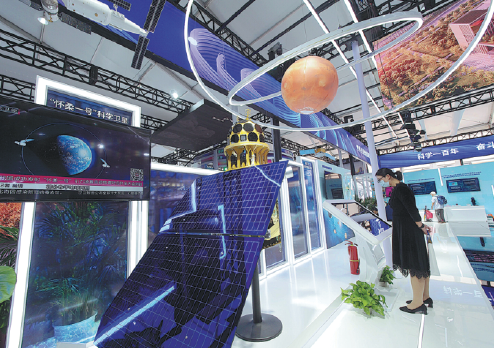Beijing top of the class in science, innovation
Creation and investment in key industrial parks pay dividends, attracting experts
Beijing has maintained scientific and technological innovation over the past five years, mainly focusing on breakthroughs in basic research and core technologies, local officials said.
Its innovation has helped the city yield fruitful results in the sector. Last year, for example, the Chinese capital ranked first in research output related to the United Nations' 17 sustainable development goals from 2015-20. This was according to the Nature Index 2021 Science Cities list released by Springer Nature, a United States-based academic publishing company.
The Chinese capital also came out on top of the global science city rankings in terms of overall performance in 2020, a position it has held since 2016.
Moreover, Beijing boasts a group of highly cited researchers and its number of invention patents per 10,000 people is 10 times the national average.
The number of national science and technology awards Beijing has won accounts for about 30 percent of the nation's total.
The city has also organized or been chosen to host a slew of high-end sci-tech events. The 2022 Beijing Academy of Artificial Intelligence Conference, for instance, kicked off online on May 31. The three-day event attracted more than 200 AI trend setters. They were represented by top Chinese and overseas academicians, including Yann LeCun and Adi Shamir, winners of the Turing Award, as well as Richard Sutton, Karl Friston, Zhang Hongjiang and Dai Qionghai.
The event included 26 forums covering such cutting-edge topics as brainlike calculation, AI for science, AI and metaverse, and brain simulation and biological intelligence. Leading experts and scientists in these sectors gathered to discuss pressing problems that needed to be addressed for AI academia, and the challenges that exist in the delivery of related industrial projects.
In the coming years, Beijing will continue its efforts to build itself into an international sci-tech innovation center and become a magnet for global talent.
The city has developed some key industrial parks in the past few years as main innovation platforms. They include Zhongguancun Science City, Huairou Science City and Future Science City.
Huairou Science City, on which construction started in 2017, has attracted top universities and major State-owned enterprises with a cluster of scientific installations and technological facilities.
During the 13th Five-Year Plan (2016-20), 29 sci-tech platforms were built in the science city, and about half of them are expected to be put into use by the end of this year.
In June 2021, the EarthLab, China's first Earth-system numerical simulation facility, was launched in the science city. As the "digital twin brother" of the Earth, the facility can simulate climate, environmental, ecological, Earth and space weather systems to predict and mitigate natural disasters.
It has simulated atmospheric carbon dioxide concentration for the first time in China, supporting the country to realize carbon neutrality by 2060.
The launch of the EarthLab is a milestone achievement for Huairou Science City and a symbol of its transformation from its construction to operation as a comprehensive national-level scientific center, according to officials.
Also, the science city's comprehensive extreme condition experimental device, built by the Institute of Physics at the Chinese Academy of Sciences, is open to domestic and foreign users. Extreme conditions such as extremely low temperatures and strong magnetic fields will help scientists observe the colorful quantum phenomena in mesoscopic systems and the microworld.

Huairou Science City showcases its expertise in science and technology at the China Beijing International High-Tech Expo in 2021. DU JIANBO/FOR CHINA DAILY
